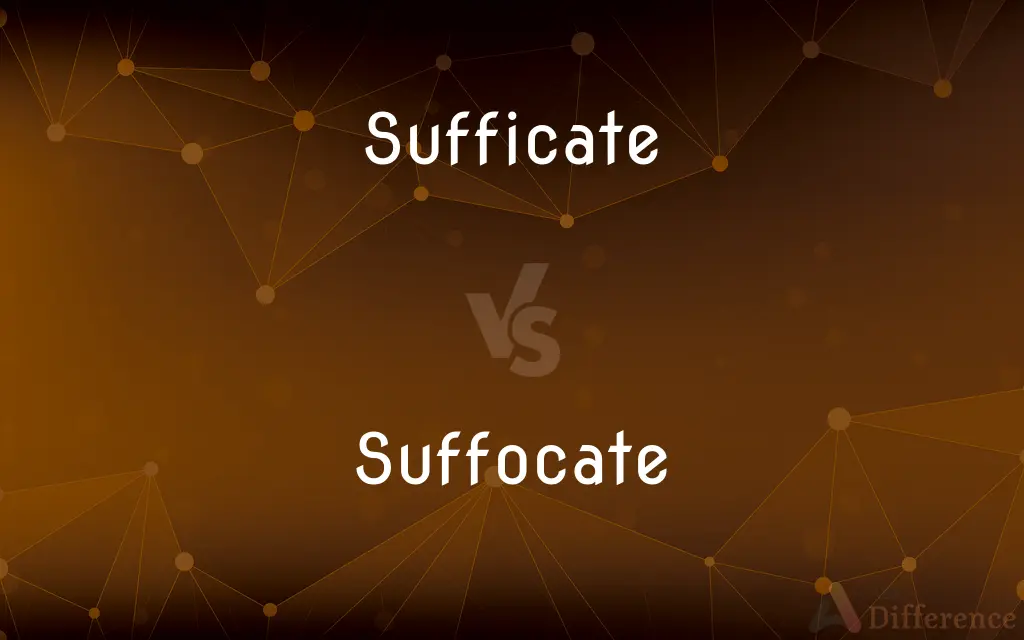Sufficate vs. Suffocate — Which is Correct Spelling?
By Tayyaba Rehman — Updated on March 28, 2024
The incorrect spelling "Sufficate" should be correctly spelled as "Suffocate," referring to the act of dying or causing death by lack of air.

Table of Contents
Which is correct: Sufficate or Suffocate
How to spell Suffocate?

Sufficate
Incorrect Spelling

Suffocate
Correct Spelling
ADVERTISEMENT
Key Differences
Remember that "Suffocate" contains the word "oxygen" without the "ygen," hinting at its meaning.
Use the mnemonic: Some Unfortunate Fish Can't Obtain Air To Exhale.
Recall that "Suffocate" has the same number of letters as "strangulate," another word for choking.
Think of "suffer" which similarly starts with "suff-" and has two 'f's.
Associate "Suffocate" with the lack of "air" - the 'o' in Suffocate can remind you of a round breathless mouth.
ADVERTISEMENT
How Do You Spell Suffocate Correctly?
Incorrect: Can you really sufficate from laughing too hard?
Correct: Can you really suffocate from laughing too hard?
Incorrect: She felt like she was going to sufficate in the crowded room.
Correct: She felt like she was going to suffocate in the crowded room.
Incorrect: Without air, the fire will eventually sufficate.
Correct: Without air, the fire will eventually suffocate.
Incorrect: The plants will sufficate if they don't get enough oxygen.
Correct: The plants will suffocate if they don't get enough oxygen.
Incorrect: He tried not to sufficate his creativity with too many rules.
Correct: He tried not to suffocate his creativity with too many rules.
Suffocate Definitions
Suffocate can suggest overpowering or overwhelming.
Plants can suffocate if their roots are too wet.
Suffocate indicates causing discomfort by being excessive or intense.
The heat was suffocating in the small room.
Suffocate means to die or cause to die from lack of air.
He began to suffocate in the locked car.
To kill or destroy by preventing access of air or oxygen.
To impair the breathing of or cause discomfort to by cutting off the supply of fresh air.
To suppress the development, imagination, or creativity of; stifle
"The rigid formality of the place suffocated her" (William Makepeace Thackeray).
To die from lack of air or oxygen.
To feel discomfort from lack of fresh air.
To become or feel oppressed; be stifled.
(ergative) To suffer, or cause someone to suffer, from severely reduced oxygen intake to the body.
Open the hatch, he is suffocating in the airlock!
(ergative) To die due to, or kill someone by means of, insufficient oxygen supply to the body.
He suffocated his wife by holding a pillow over her head.
To overwhelm, or be overwhelmed (by a person or issue), as though with oxygen deprivation.
I'm suffocating under this huge workload.
(transitive) To destroy; to extinguish.
To suffocate fire
(obsolete) Suffocated; choked.
Suffocated; choked.
To choke or kill by stopping respiration; to stifle; to smother.
Let not hemp his windpipe suffocate.
To destroy; to extinguish; as, to suffocate fire.
To become choked, stifled, or smothered.
Deprive of oxygen and prevent from breathing;
Othello smothered Desdemona with a pillow
The child suffocated herself with a plastic bag that the parents had left on the floor
Impair the respiration of or obstruct the air passage of;
The foul air was slowly suffocating the children
Become stultified, suppressed, or stifled;
He is suffocating--living at home with his aged parents in the small village
Suppress the development, creativity, or imagination of;
His job suffocated him
Be asphyxiated; die from lack of oxygen;
The child suffocated under the pillow
Feel uncomfortable for lack of fresh air;
The room was hot and stuffy and we were suffocating
Struggle for breath; have insufficient oxygen intake;
He swallowed a fishbone and gagged
Suffocate can describe feeling trapped or confined.
She felt suffocated by the city's noise.
Suffocate implies suppressing or stifling something.
Their voices were suffocated by the loud music.
Suffocate Meaning in a Sentence
If you cover a candle, it will suffocate without oxygen.
She felt like she was going to suffocate in the tight elevator.
The room was so stuffy, I thought I would suffocate.
Plants can suffocate if their roots are too waterlogged.
Too many pillows might suffocate a small baby in a crib.
In dense forests, tall trees can suffocate the undergrowth by blocking sunlight.
Fish out of water suffocate because they can't breathe air.
Overprotection can suffocate children's sense of independence.
He opened the window, afraid he would suffocate in the heat.
Garbage bags can suffocate small animals if they get trapped.
Firefighters wear masks to not suffocate in smoke.
She cracked a window in the attic room so she wouldn't suffocate in the summer heat.
Excessive control can suffocate innovation in a company.
Airtight containers can suffocate bugs in stored grains.
Heavy snowfall can suffocate early spring flowers.
Suffocate Idioms & Phrases
Suffocate the spirit
To destroy someone's enthusiasm or desire to pursue interests or passions.
The rigid school system can sometimes suffocate the spirit of creative students.
Suffocate creativity
To hinder or stifle creative thinking or ideas.
Micromanagement in the workplace can suffocate creativity.
Suffocate under pressure
To perform poorly because of too much pressure.
The team seemed to suffocate under pressure during the finals.
Suffocate the opposition
To suppress or eliminate opposition or competition.
The company tried to suffocate the opposition by buying out competitors.
Suffocate someone with love
To overwhelm someone with too much affection or attention.
She worried she might suffocate her children with love, not giving them enough freedom.
Suffocate a dream
To crush or destroy someone's dream through negativity or lack of support.
He felt his environment was suffocating his dream to become an artist.
Common Curiosities
What is the root word of Suffocate?
Derived from Latin "suffocare."
Which vowel is used before Suffocate?
The vowel 'e' is used before Suffocate.
Which preposition is used with Suffocate?
"by" as in "suffocated by smoke."
Why is it called Suffocate?
It's derived from Latin "suffocatus," past participle of "suffocare" meaning to choke or stifle.
What is the singular form of Suffocate?
Suffocate.
What is the plural form of Suffocate?
Suffocates.
Which conjunction is used with Suffocate?
"and" is commonly used.
Is Suffocate a noun or adjective?
It's primarily a verb but can be used as a noun in some contexts.
What is the verb form of Suffocate?
Suffocate.
What is the pronunciation of Suffocate?
/ˈsʌfəˌkeɪt/
Which article is used with Suffocate?
Both "a" and "the" can be used depending on the context.
Is Suffocate a countable noun?
No.
Is the word Suffocate imperative?
It can be used in an imperative form, e.g., "Don't suffocate the plant!"
Is the word “Suffocate” a Direct object or an Indirect object?
It can serve as a direct object, e.g., "The smoke might suffocate him."
Is the Suffocate term a metaphor?
It can be used metaphorically, e.g., "suffocated by responsibilities."
What is a stressed syllable in Suffocate?
The first syllable, "Suf," is stressed.
Which determiner is used with Suffocate?
"This" or "that" can be used, depending on context.
Is Suffocate a negative or positive word?
Negative, given its association with death and discomfort.
Is Suffocate a vowel or consonant?
Suffocate is a word, not a single vowel or consonant.
How do we divide Suffocate into syllables?
Suf-fo-cate.
What part of speech is Suffocate?
Verb or noun.
What is the opposite of Suffocate?
Breathe.
What is the first form of Suffocate?
Suffocate.
What is the second form of Suffocate?
Suffocated.
How is Suffocate used in a sentence?
Without fresh air, the fire will suffocate.
Is Suffocate a collective noun?
No.
Is the word Suffocate a Gerund?
"Suffocating" is the gerund form.
How many syllables are in Suffocate?
3 syllables.
What is another term for Suffocate?
Asphyxiate.
Is Suffocate an adverb?
No.
Is Suffocate an abstract noun?
No.
What is the third form of Suffocate?
Suffocated.
Share Your Discovery

Previous Comparison
Mediocore vs. Mediocre
Next Comparison
Similer vs. SimilarAuthor Spotlight
Written by
Tayyaba RehmanTayyaba Rehman is a distinguished writer, currently serving as a primary contributor to askdifference.com. As a researcher in semantics and etymology, Tayyaba's passion for the complexity of languages and their distinctions has found a perfect home on the platform. Tayyaba delves into the intricacies of language, distinguishing between commonly confused words and phrases, thereby providing clarity for readers worldwide.


































